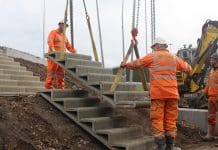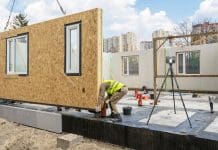Scaling up and maturing the offsite manufacturing sector could create an “Uber moment” for housebuilding, says Dave Sheridan, executive chairman of ilke Homes
As part of her farewell tour, Theresa May attended this year’s Chartered Institute of Housing conference, where she gave a speech claiming “step by step and piece by piece, the government and the sector have begun to turn around the crisis in British housing”.
But while I commend her efforts, the numbers don’t lie. The Ministry of Housing, Communities & Local Government’s latest figures reveals that the number of new builds starting on-site fell by 9% in Q1 of 2019 compared to the same period last year, while completions fell by 1%. Faced with a chronic housing shortage, this is completely unacceptable. We need to change – and fast.
This necessity to change is what spurred us at ilke Homes to launch our latest report, It All Stacks Up: Building Homes Using Volumetric Manufacturing. By compiling our own experience and knowledge of the wider modular sector, the report offers practical guidance to central government, local authorities and contractors that are exploring – or already using – volumetric manufacturing to deliver much-needed homes throughout the UK.
As a recent report from professional services firm Arup made crystal clear, the impacts of innovative approaches to housebuilding would be far-reaching. The report stipulates that if just a third of new homes were created using Modern Methods of Construction (MMC), the industry would be able to deliver an additional 265,000 homes. Revolutionising the way we deliver homes is an opportunity that we cannot miss.
Creating an “Uber moment” in construction
Scaling up, and maturing, the offsite manufacturing sector could create an “Uber moment” for housebuilding, speeding up delivery, cutting cost and giving customers unrivalled choice and quality.
Yet changing the way the industry has operated for hundreds of years is never straightforward. Change usually happens incrementally – we introduce new materials, new techniques and allow skills to be acquired gradually. But sometimes, gradual change is not enough, none more so than in housebuilding, where approximately 320,000 people are registered homeless and 1.1m households sit on council waiting lists.
Scaled-up offsite manufacturing is the fastest way of delivering high quality new homes, at around 50% faster than traditional methods. While both modular and traditional projects start the same, once they break ground, the two take dramatically different paths to completion.
Unlike traditional construction, the creation of manufactured homes can begin while the work starts on site. This means that homes are ready to be installed as soon as the foundations have set, wiping months off build programmes and opening revenue streams sooner.
And because the homes are delivered to site 95% complete, they’re ready for residents to move in almost immediately, while a traditional home is only just gearing up for its plumbing and electrical fit-out.
But, while speed is important, so is quality. By using digitally enabled precision engineering techniques, within a controlled factory environment, homes can be delivered without compromising on quality. And higher quality homes create a range of benefits for housing providers and their customers, from fewer costly and time-consuming defects to cheaper energy bills.
One of the main challenges for the sector is challenging the negative preconceptions that still exist around post-war prefabs and the design of factory-built homes. Now, these historic preconceptions couldn’t be further from current reality. At ilke, for instance, our manufacturing process allows us to create beautiful homes that can be adapted over their lifespan and engineered for a variety of tenures, whether they are homes for first-time buyers or elderly downsizers.
Digitally enabled design and manufacturing will give customers greater control over their home, with the ability to adapt and customise aspects over time – this is the very essence of the “Uber moment.”
Offsite manufacturing will also help wean housing off its current carbon addiction. No matter which industry you look towards, sustainability is high on the agenda. Currently, the UK’s built environment accounts for a whopping 45% of total UK carbon emissions and 32% of landfill waste. It’s obvious that the UK needs to ramp up its housing delivery efforts, but it’s important that this doesn’t come at the expense of worsening emissions.
Offsite manufacturing’s pioneering design can help with this. As most of the build process takes place in factories, fewer building materials and people are required onsite. A reduced number of deliveries, site traffic and waste slashes a development’s carbon intensity. A recent inquiry by the MHCLG laid bare the huge environmental benefits of offsite, estimating that modular construction can reduce the energy used in the construction process by 67% and waste produced onsite by between 70% and 90% in comparison with traditional construction methods.
Helping reduce carbon emissions doesn’t stop after the build stage, either. The energy efficiency of a modular home means it takes approximately 30% less energy to heat – an important consideration as 72% of domestic emissions arise from space heating and the provision of hot water. As such, an offsite home is better for both residents’ pockets and the planet.
Scaling the barriers
Understanding the barriers that still persist around the adoption of offsite manufacturing are just as important as understanding the benefits. If the central government, local authorities and contractors work collaboratively to break these down, housing delivery can be sped up and the offsite sector can scale to reach its true potential.
For too long, the word “prefab” has been associated with low quality, derived from the days of post-war reconstruction. The offsite manufacturing sector needs to speak as one to make these misconceptions a thing of the past. By showcasing the beauty of factory-built homes and how they can deliver the scale and quality the UK needs, we can ensure that offsite is seen as a genuine long-term strategy for solving our country’s housing shortage.
Last, but certainly not least, is the UK’s skills shortage. With an ageing workforce, a dwindling pipeline of young talent and the exodus of EU workers, the government is going to struggle to meet its ambitious but necessary housing targets. There is an urgent need for the diversification of the construction industry’s workforce. Offsite manufacturing can help drive this diversification, showcasing what a modern and robust industry looks like in order to attract a raft of new talent, and helping provide the clear and comprehensive career paths that are currently lacking in traditional construction.
Change is on the horizon
The good news is that modular is finally gaining momentum. In the first half of 2019, we saw a series of seismic deals that have shown real, palpable confidence in the housing revolution.
At ilke Homes, we recently announced a partnership with Places for People, the country’s largest placemaking organisation, in the UK’s biggest-ever permanent modular dwelling partnership worth an estimated £100m.
Together, we will build high-quality housing that is ecologically sound, affordable and created at pace. This joint venture will create sustainable communities, greener living spaces and allow homebuyers the opportunity to own a home that they can adapt over their lifetime. It will also offer an affordable, smart and swift solution to the UK’s housing inertia.
Even global banking institutions are realising the industry’s transformation. In April, Goldman Sachs made its debut in the sector, investing £75m in UK modular housing provider TopHat. While later in the year, Japan’s modular giant Sekisui, the government’s housing accelerator Homes England and We Buy Any Car founder Noel McKee placed healthy bets with Urban Splash in deals totalling £90m.
The underlying challenges of the housing shortage are much more complex and political than simply finding a quicker way to build. However, offsite manufacturing is well placed to make an invaluable contribution due to its ability to deliver quality homes at speed amid a construction skills shortage.
It’s clear to see that developers and policymakers alike are getting an appetite for offsite, quickly appreciating the advantages that can be passed on to homeowners and communities across the UK. The future of housing is well and truly here – and we must seize it.
Dave Sheridan
Executive Chairman
Tel: +44 (0)1904 924 100
Twitter: ilkehomes
LinkedIn: ilkehomes

















